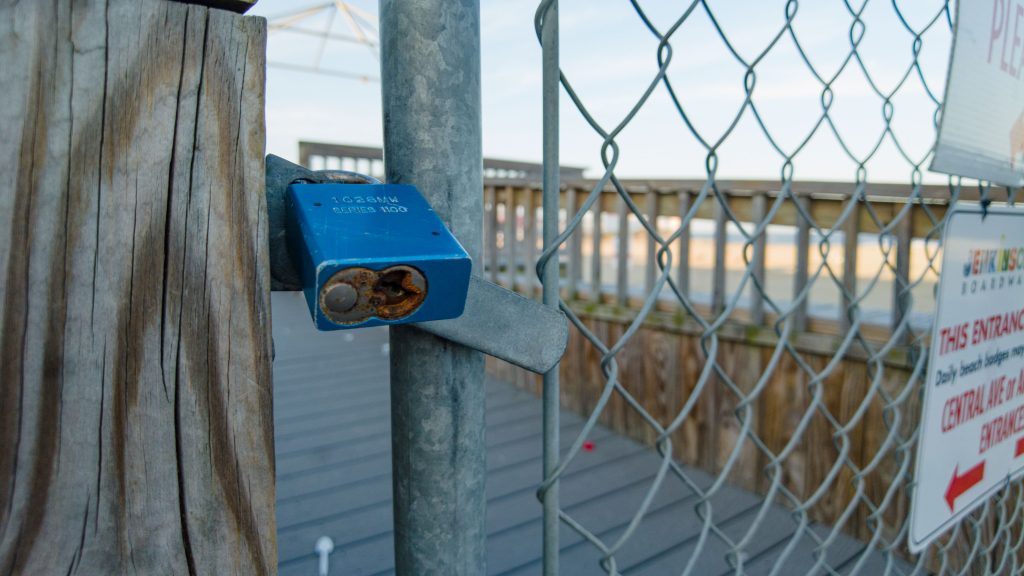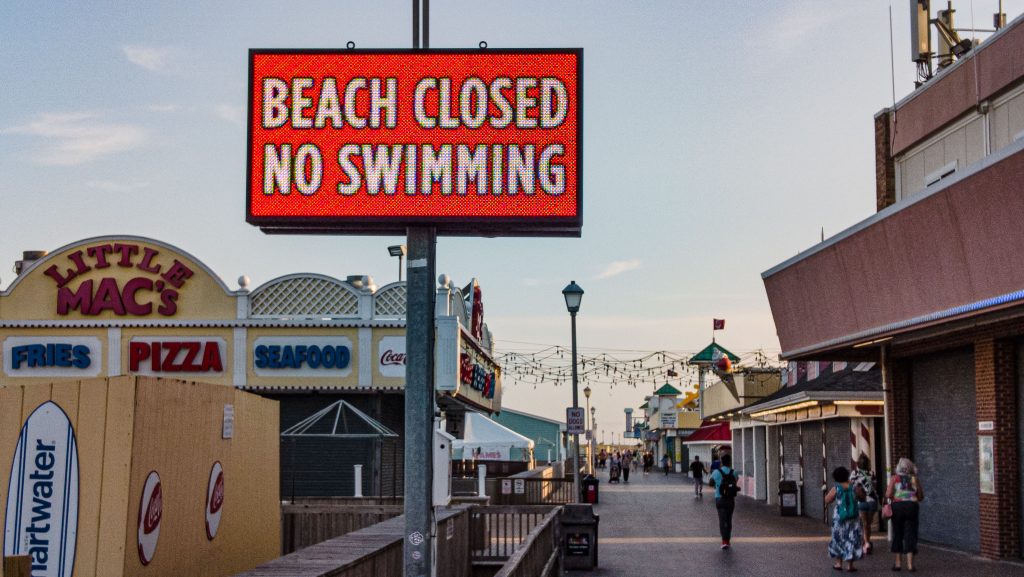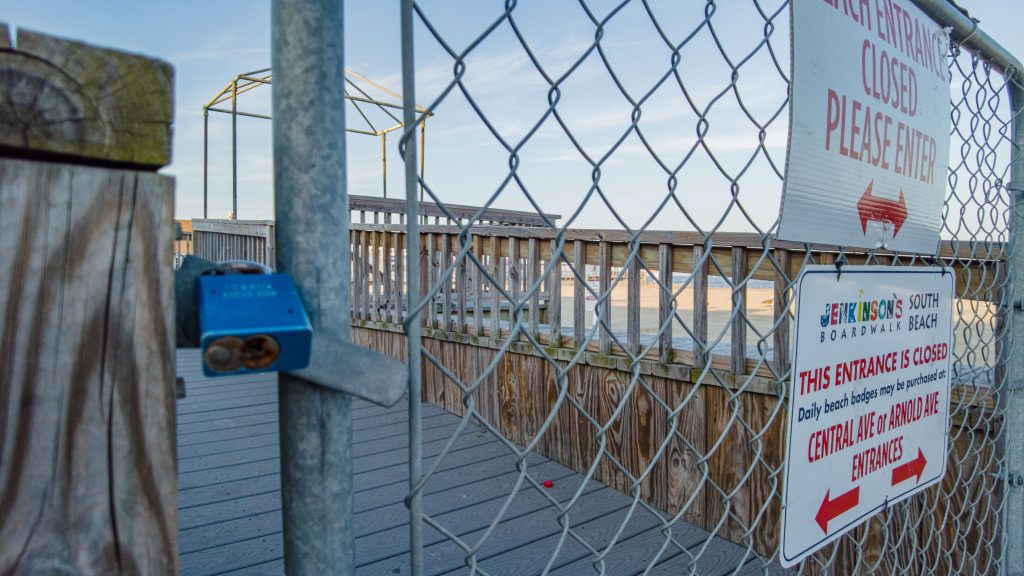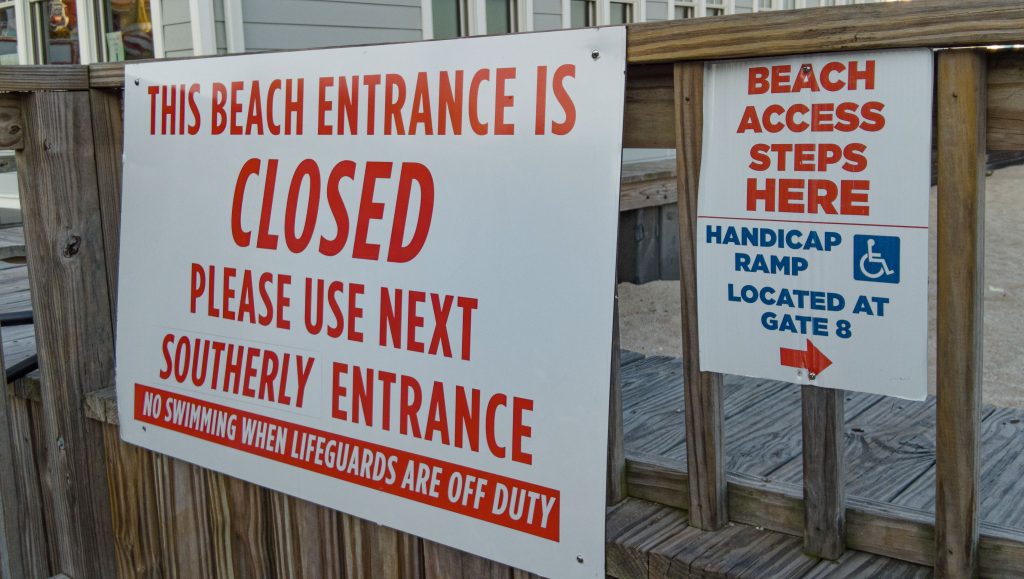The skies were sunny Tuesday, with a moderate breeze of about 10 m.p.h. and temperatures in the 80s. The beach in Point Pleasant Beach, however, was fully devoid of – anybody.
Jenkinson’s, a private company which owns the beach itself up to the high water mark as well as effectively all of the beach access points in town, abruptly closed all of the town’s beaches this week, purportedly in response to a lawsuit that was filed over an off-season drowning three years ago.
 Closed and locked beaches in Point Pleasant Beach, N.J., Sept. 12, 2023. (Photo: Shorebeat)
Closed and locked beaches in Point Pleasant Beach, N.J., Sept. 12, 2023. (Photo: Shorebeat)
|
|
Mayor Paul M. Kanitra announced the closure via social media, but reached for comment by Shorebeat later, said he was unable to make a statement on the matter, adding that he cannot become personally involved in it.
“I have just been informed that as an apparent result of a drowning in the off-season, and a subsequent lawsuit, Jenkinson’s has made the very unfortunate decision to close all of their beaches and all of their access points,” said Kanitra via social media. “Please understand that Jenkinson’s is a private company that owns the majority of beaches and beach access points in Point Pleasant Beach. I want to make it very clear that this decision is not the Borough of Point Pleasant Beach’s and that the only beach that the town owns, Maryland Avenue, is open for guests in accordance with our local beach ordinances.”
Requests for comment to both Jenkinson’s as as well as the state Department of Environmental Protection are pending.
New Jersey’s beach access laws are among the most protective in the nation despite the state’s notoriously-heavy amount of privately-owned beachfront. New Jersey recognizes the so-called Public Trust Doctrine, which states that certain natural lands are, by law, held in the public trust by their owners, whether public or private. Traditionally, while the public trust doctrine covers access to the area between the mean high and low water marks, there is significant volumes of case law and environmental administrative policies that govern public access to beaches, especially when they are owned by for-profit businesses rather than individual homeowners.
Indeed, Kanitra’s message Tuesday urged those with concerns to contact either Jenkinson’s or the DEP directly.
“Please direct any questions directly to Jenkinson’s on this matter at 732-892-0600,” the announcement said. “In the absence of an acceptable response from Jenkinson’s, please note that the New Jersey Department of Environmental Protection has the primary responsibility for ensuring your access to the beach. Their phone is: 609-777-3373.”
A complaint filed with the DEP, whether from a public agency or a private citizen, could conceivably add a new layer to the case separate from the wrongful death claim, centering on beach access and corporate ownership of beaches.
While the lawsuit that spurred the closure was not identified by Kanitra’s announcement, and yet to be confirmed by the company, a search of court records indicates one wrongful death case pending against Jenkinson’s stemming from a post-season swim that resulted in a 69-year-old man succumbing to injuries sustained while rescuing his grandson.
Members of the Timparo family, of Randolph, Morris County, are suing the company, alleging their paid for parking, were “invited” onto the beach Sept. 23, 2020, but never informed that there were various weather advisories in place that day indicating swimming could be dangerous.
The “beach front area and open access gate in the area of Arnold Avenue did not contain adequate warnings about the ocean water conditions to alert invitees about the then present dangers of standing, walking, or wading near the water’s edge,” wrote attorney Cynthia A. Walters in the complaint, which is embedded below.
No lifeguards were on duty the day of the incident, the complaint states. It alleges Jenkinson’s “had a legal duty to maintain the … beach front area reasonably safe for invitees, including the duty to monitor and investigate beach and ocean water conditions, the duty to warn the invited public about dangerous conditions of which they knew or reasonably should have known and/or the duty to control and close beach access or to otherwise act in the face of dangerous and/or unsafe beach and ocean water conditions to protect the safety of invitees.”
Jenkinson’s, in its answer to the wrongful death complaint, cited contributory negligence on the part of the plaintiffs, and the plaintiffs’ losses were caused by “entities over which the plaintiff had no control.” There is also a claim that the statute of limitations on the case had expired.
A copy of the answer to the case is also embedded below this article.
The last action in the case took place Tuesday, when Jenkinson’s attorneys motioned to extend the discovery period of the litigation.
~
Read the Complaint:
Read the Answer:















